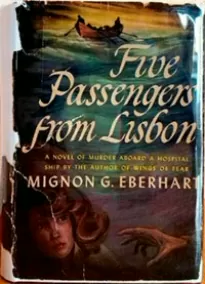Five Passengers from Lisbon

- Автор: Mignon Eberhart
- Жанр: Детективы
Читать книгу "Five Passengers from Lisbon"
3
She heard everything he said; she did not think beyond the incomprehensible fact of murder.
It is one thing to state a truth; it is another thing for the mind to accept it as truth. Or perhaps the mind accepts where understanding rejects. It wasn't possible that during the horror of those hours in the lifeboat another horror had added itself quietly to the night, and that was murder. She rejected it and yet had to accept it as true.
After a moment, Marcia said slowly: "If he was murdered in the lifeboat, if there is no other possible explanation for his death . . ."
The Captain looked ahead, showing a hard, strong profile. After a moment, he said flatly: "He was murdered."
"Well. Then I see, of course, that someone in the boat must have done it. But we were so preoccupied with a struggle for life, all of us, that it is hard for me to believe that anybody could have cared enough—to—to murder anybody." Suddenly murder itself, the fact of murder, became tangible, as if it had a stealthy and furtive and horrible being. Then and there, in that cabin, so she moved uncomfortably, suddenly chilled and cold. Suddenly aware again of the slight motion and creaking of the ship.
But murder, if it had existed, was in the lifeboat, not the hospital ship. The seeds of that murder had been sown on the Portuguese ship. She said suddenly: "The two seamen . . ."
"Did you see either of them kill Alfred Castiogne?"
"No, no . . ."
"Why, then, do you imply that one of them killed a man? It is a grave charge. Miss Colfax."
"I don't know anything of the murder. Captain. It is very difficult for me to believe it; that is, to understand how it could have happened."
The Captain rose abruptly, paced across the cabin and back again and stopped before her, looking down, "That part of it seems fairly obvious," he said, his thick white eyebrows jutting out over his shrewd, sharp blue eyes. "Almost any one of the people in that boat could, I believe, have managed to stab Castiogne without being seen. You were all, as you say, confused, preoccupied, changing places when necessary, each aware mainly of his own danger and his own discomfort. If the murder occurred after you sighted the
"Because they knew him; they must have known him. There may have been some—oh, some grudge, some quarrel. The rest of us were passengers only."
"In other words, you are deliberately blaming one or both of these men?"
"No, I didn't say that."
"Listen, Miss Colfax, every one of the passengers in that lifeboat has suggested that solution. It is so unanimous a belief on the part of the five of you that one might be inclined to think that you actually knew of the murder and mutually agreed to blame the seamen."
"No, no, you are wrong. Don't you see. Captain Svendsen, how confusing it is, how terribly shocking and . . . ?"
He interrupted: "How long have you known the Cates couple?"
"I met them in Lisbon for the first time. That is, of course, I'd heard of them. I knew their name; everybody knows that, I suppose. They were always in the papers."
"Where in Lisbon did you meet?"
"At the hotel, while we were waiting to get some sort of passage."
"What about Gili Duvrey? How long have you known her?"
"She was at the hotel, too. I saw her, here and there, in the cocktail lounge or the lobby. Then, when we reached the ship, we—Gili and Mrs. Cates and I—shared a cabin."
"Do you know anything of her other than that?"
"No."
The Captain lighted his pipe again, with slow deliberate puffs, watching her closely with those bright, shrewd blue eyes. Again incredulity caught at Marcia. She tried to see Gili, or Daisy Belle, or Luther, creeping forward in that lurching mad lifeboat, knife in hand, stabbing at the hunched figure of the third officer, but it was a picture which she simply could not summon up in her mind. All her instincts rejected it as completely and finally as if she had tried to fit herself into that fantastic picture. The Captain said suddenly: "Miss Colfax, look at that thumb."
She saw with a start that he was holding out his great fist toward her, the thumb upward, wide and powerful. "There are hundreds of lives under that thumb," he said, "all the time—lives in my care. I am responsible for the ship and every life upon her. I can marry people and bury people. And I can kill people if need be."
He smoked for a moment and said simply: "I am the master of this ship. You and all those people from the lifeboat are now on this ship and under my care. I am particularly responsible because of the load I carry—sick and wounded men who have fought for America. For you, for me. It is my job now to see to them. I had to pick you up last night. I had to circle as I did, in case there were other lifeboats; I found none and continued my course. A short time after I picked you up the doctor who examined the body of Alfred Castiogne reported the murder to me. There are two things I can do; I can put you all under arrest and in confinement until we reach home. Or I can induce you to tell who murdered him. I don't propose to let a murderer run at large on my ship. Do you understand me?"
His honesty, his force of character, something enormously solid and strong in the very way he sat, a thick blue bulk in the chair, and looked at her with those deep-set, steady eyes, compelled respect and a kind of liking. She said: "Yes, I think I do understand. But I . . ."
"You still cannot quite believe this man was murdered. Never mind that now. The point is the
That had nothing to do with the murder of the third officer of a little Portuguese cargo ship. And he was waiting for a reply. Why hadn't she returned to America sooner? Long ago when the war began?
Her thoughts went swiftly back over those war years that had seemed so long and so ugly, so filled with terror and despair, so tenuous with hope that Mickey would escape and would come to her—as eventually he did. In fact, of course, it was a very brief story, and not unusual.
"I hoped that . . ." She caught herself; she must say Andre Messac, not Mickey Banet; she must remember that. She went on: "I hoped that Andre would return. He was taken to a concentration camp when the Germans occupied Paris." She paused. The man opposite was still tapping his pipe lightly, watching it. The small taps were like little periods, spacing and punctuating memories.
So many memories . . . Marcia's mind went swiftly back five years, to the great gray ship, the
That day had launched the gay holiday voyage during which she had met Mickey.
There followed a packed and important—but very quickly passing—period of time. London and humid July weather and Mickey. Paris and August and Mickey. September and war, and Mickey telling her he loved her.
After that, naturally, she remained in France, and would not return to America with Teresa and her aunt, in spite of their pleading, in spite of the war, in spite of the frantic cables from her father. She could remember saying good-bye to Teresa and the older woman, in the wild turmoil of the Gare du Nord and her return to the small, very French hotel back of the Madeleine.
And then there was the first autumn of the war. She had walked with Mickey, lunched with Mickey, dined with Mickey; listened to Mickey practice at the great piano in his apartment for hours on end, and listened to Mickey and his friends talk of the war. She herself had been lulled as Paris was lulled that winter with the Maginot drug; but not Mickey and not a small select nucleus of his friends. All over Paris actually there were men who believed that they could see ahead; already that winter the seeds of what was later to be a vast organization for French resistance were sown.
She had not known actually, however, that Mickey was a part of that beginning movement. Up to then his only interest had been music; he was on the beginning wave of what would certainly have been a great career; already people were beginning to know his name, he had played in London and in New York with brilliant press notices; he was in fact returning from a series of American concert engagements including an almost spectacular reception at Carnegie Hall when Marcia met him on the ship. He was then a slender, gay, contentedly engrossed young man, with his tanned face and light, sun-streaked hair and gray eyes which, Marcia had always thought, were exactly the color of the sea, as deep, as clear, as changeable; he had no thought of politics, no thought of anything but music. And the war ended that.
It ended his career in the first place because it brought all the bright world of the thirties crashing to an end. It ended his career later for a more specific reason.
In May the Germans entered Paris; Mickey and three other men she had known were arrested.
Captain Svendsen was still tapping the pipe lightly and precisely upon the tray. It seemed strange that her memory could travel so many weary months while a man waited and tapped tobacco from his pipe. He said, lifting the pipe at last to frown into the bowl: "You were in Paris, then, when the war began? And you went to Marseilles?"
"I went to Marseilles later, that summer, after the Germans occupied Paris. I was with a friend—Madame Renal. She had a car and we drove to her villa. It was on a hill just outside Marseilles."
Again, as if a swift series of pictures flashed across some mental screen she remembered that flight from Paris. They had all intended to go together; at least that was what she thought when the plan was made. She and Mickey and Madame Renal—the kind, stout old Frenchwoman her father had cabled her to get in touch with; somehow, somewhere in business probably, he had known Madame Renal and her husband. Madame Renal had a car, gasoline and a villa near Marseilles; she was old and ill and she could not make the journey alone. Otherwise, Marcia would not have gone with her, for at the last Mickey did not come. She would never forget and she did not want to remember that day in Paris, the frantic, seething day of unutterable confusion while she tried to find Mickey, and in the end gave up and went with Madame Renal. They left Paris about nightfall; at five o'clock the next morning they were exactly three miles away, but by that time she could not have made her way back to the city. Mickey would find them; he knew where they were going; he knew the address—so Madame Renal assured her over and over again. Somewhere along the road they picked up three women, an old man and a cat. When they reached the villa, cold with its stony floors, Mickey was not there. A month later she learned that he had been arrested and sent to Germany.
The women drifted away; the old man and the cat stayed on with her and Madame Renal. The thought of those long, cold, waiting years was too close and too full of tragedy to bear remembering. She said to Captain Svendsen: "Andre finally escaped, just at the end of the war; he knew where I'd be, of course, and came to me there as soon as he could."
The Captain began to refill his pipe. "Wouldn't it have been better to wait in Lisbon until you could get passage directly home? If your people are there . . ."
It seemed to Marcia for an instant that the man sitting opposite her, watching her so closely over his pipe, was bent upon touching all the sore and poignant scars of the past years. She said: "My father died while I was in Marseilles; the first summer after the Germans entered Paris. I learned of it months later through the Red Cross."
There was a slight pause; then the Captain said: "I'm sorry, Miss Colfax. Go on, please."
Go on? Oh, yes, why had they taken passage on the little Portuguese ship bound for Buenos Aires instead of home? But how could she tell him or describe to him her anxiety about Mickey, the urgency of her wish for him to leave Europe, with all its inevitable and tragic souvenirs of war? New surroundings, any new surroundings, a fresh start, a different place . . . These things Mickey had to have, for his soul's sake. His eyes were alight, his face had looked young and gay again, and full of hope and vitality for the first time when he had brought her, actually, another man's passports and the news of the possibility of a Lisbon sailing.
Practically, however, there was another reason, one she hadn't talked of to Mickey. She said slowly: "He had suffered greatly; I wanted him to be away from Europe as soon as possible. Also . . ." She hesitated; the passport situation would have to remain as it was, at least until she had talked to Mickey and they had decided together to tell the truth of it; but there was no harm in telling Mickey's profession. She went on, being careful again to say "Andre": "Andre, as he may have told you, was a musician, a pianist. Perhaps the Germans knew that; perhaps it was merely one of their unspeakable forms of torture. In any case, you've seen his hands; his fingernails and the ends of his fingers . . ."
Her throat grew rigid and hard, so she stopped; the Captain nodded, his face hardened. "I saw them. I've seen several such."
"I want to get him to a plastic surgeon. I don't think he can ever play again; but there may be some hope. It seemed important to get him home, by any means that we could, as soon as possible."
"I see. Yes, I see that. There may be some hope. Miss Colfax, you are being quite frank with me?"
Mickey's passport was not Mickey's; she had not told him that. There had been, however, no other evasion. "Yes."
"And there is really nothing you can tell me of the murder of this man Castiogne?"
She wondered briefly if he had questioned her, urged her to talk in the hope that she might inadvertently give him some grain of information relating to Castiogne. She shook her head. "Nothing."
"Very well then . . ."
Someone knocked, interrupting him, and Captain Svendsen said: "Yes? Oh, Colonel Morgan. Will you come in?"
A tall, well-built man, a patient obviously, for he wore a long crimson dressing gown, came into the room, followed by Major Williams, who closed the door again behind him. Captain Svendsen said: "Miss Colfax, this is Colonel Josh Morgan."
The tall man in the red dressing gown turned to her quickly. She caught a flash of narrow and rather intent blue-gray eyes before he bowed, and then took the hand she held out toward him—took it, however, with his left hand as his right arm was in a sling. He said, conventionally, except for that intent look in his browned face and in his level eyes: "How do you do, Miss Colfax?"
Captain Svendsen said: "You haven't met before, I take it."
"Why—no." Colonel Morgan hesitated, looked at Marcia again directly, and said: "Or have we?"
She had met, casually, many Americans in Paris before the war, and in Marseilles after the Americans came. But she would have remembered this man, she thought suddenly; his black hair, the curve of his mouth; his quick, direct look; something strong and substantial and yet daring and youthful about him, that suggested imagination and inventiveness held in reserve, weighed and tested by a matter-of-fact good sense; she would have remembered him for all that. But also there was some spark, some extra bit of electricity in the air between them; it was curious, a small and unimportant fact, but a fact. She knew that she'd have remembered him. She said slowly: "No, no, I'm sure we've not met," and Colonel Josh Morgan said: "No, of course not. I'd have remembered you," and smiled briefly.
It was, merely, a conventional, pleasant compliment, but it startled her a little, because it was so near her own thought. She met his eyes for an instant that suddenly seemed a long time; as if she had met that deep and direct look, unguarded, with no barriers between many, many times. Which was nonsense! She turned abruptly toward Captain Svendsen, who said: "Colonel Morgan was a newspaperman in civilian life. He spent considerable time in Paris before the war. I thought conceivably you might have met."
Marcia thought swiftly: he is trying to check my story, my identity. Why?
Josh Morgan said shortly: "Paris is a big place."
"Yes," said Captain Svendsen, heavily. "Yes. Still the American colony was not large. One often knows one's compatriots in any city. There were some other Americans on the lifeboat we picked up, Colonel."
"Oh, is Miss Colfax one of the
Captain Svendsen nodded. "There were five passengers," he said exactly. "And two seamen, besides the man who was killed. They were"—Captain Svendsen's blue eyes watched Colonel Morgan sharply as he named them—"a Mr. and Mrs. Cates, Americans. I mean United States citizens. Gili Duvrey, French. Miss Colfax, here. An Andre Messac—French also."
It seemed to Marcia that a flash of something like surprise came into Colonel Morgan's eyes. When he spoke, however, his voice was flat and impersonal. ''The Cates?" He asked. "The famous Cates? I think his name is Luther."
"Yes. Do you know them?"
Colonel Morgan reached for cigarettes and with his free hand managed to extract one. "I knew of them. It's a famous name. Tons of money—patrons of the arts—fashionable, smart. Rather decent as I remember. But I never knew them."
"Well," the Captain sighed and rose. "I won't trouble you further just now. Miss Colfax. I hope you are comfortable. I see they've made a nurse of you. There was no civilian clothing for any of you; the Geneva Convention forbids us to carry civilians. But we couldn't leave you to float around in a life boat!"
There was a faint brief twinkle in those deep-set, far-seeing blue eyes. She said quickly: "I haven't thanked you, Captain Svendsen . . ."
He would have none of that. He made a brusque motion with the great hand that held the pipe. "Part of my job, part of my job. Fortunate we happened upon you and saw your rocket. Unfortunately, once we'd rescued you we cast the
Major Williams opened the door. Colonel Morgan made a sort of motion toward her, stopped, and said: "I hope we'll meet again, Miss Colfax."
"You're very likely to," said Captain Svendsen rather dryly. "The ship is not a large one."
Major Williams at the door, looking very young and thin and tall, and smiling down at her in a friendly way, said: "Do you feel all right? Shall I take you to your cabin . . . ?"
"I'm quite all right, thank you, Major." She took up the nurse's coat which had slid back upon the chair.





